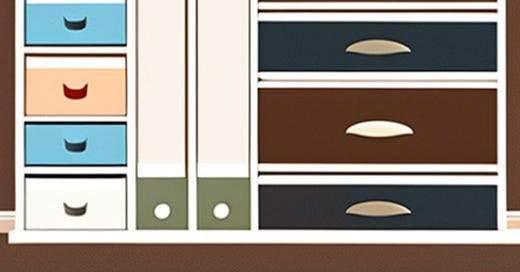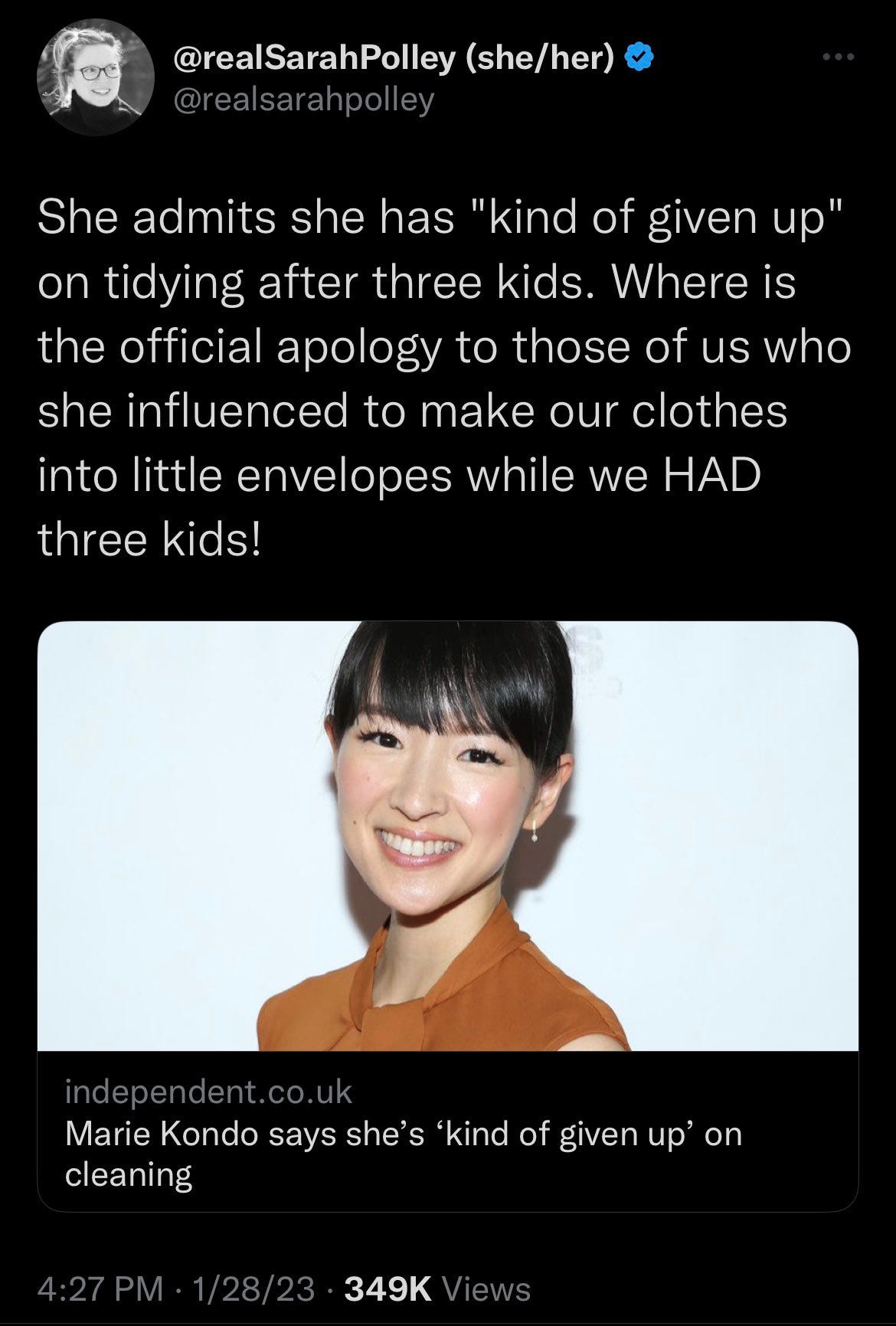Let’s take morality out of homekeeping
Last week, an article was published by the Washington Post about Marie Kondo. In it, she discusses not only her newest book, but also how she’s 'kind of given up' on being so tidy, and wow people on the internet had a lot to say.
If you aren’t familiar with Marie Kondo, her book (and her Netflix show), the life-changing magic of tidying up took people by storm a few years ago. In it, she advocates for decluttering by getting rid of anything that doesn’t “spark joy”. She also gives tips on how to keep your drawers tidy, and how to find homes for things that always end up in places you don’t want them to be (like if you have a mail basket but somehow the mail always ends up on the kitchen counter instead), which I can definitely see the value in.
And while many of her methods were helpful for a lot of people, her approach was also really polarizing. Some people absolutely loved doing each step she recommends, even documenting their journey on social media. Others viciously attacked (as internet trolls can do so well) those that “bought in” to her ideas.
Change is hard. Something like the KonMari method can make it easier; if followed to the letter, it can take away a lot of the ambiguity and hesitancy around change. And the most vocal opponents to her methods also demonstrate how hard change is. Sometimes it’s so hard that even witnessing someone else willingly creating change is a trigger that brings out someone’s inner internet troll.
To be fair, she never said that everyone must follow her methods; if you don’t care about a tidy house just don’t read her book. But even just typing that made me feel like I would be judged if I didn’t *want* to learn how to keep a tidy house. I don’t think a tidy home is a moral issue, but I also do feel like there is judgment around it (and, hence, a market for this book and others like it), which makes it seem like somehow homekeeping has been assigned some sort of morality.
Home economic books (aka how-to, or life-skills books) are usually stocked in the “self-help” section of bookstores. While I don’t have a better idea of what section they should live in, it has always felt kind of icky that they do live there (or, maybe, I am just wishing for a better term than “self-help”). And I can’t help but wonder how this reinforces the idea of morality in relation to homekeeping: if you are looking for a book with tips and tricks on how to keep a tidy house and it’s stocked in the same section with books about how to “win at life”, the implication being that if you can’t master whatever is in the book you’re holding, you are ‘losing’ at life. Which then brings us to: How is living in a home with dishes to be washed or clothes to be put away ‘losing’ at life?
Coming back to the article that was published last week, let’s have a look at a few of the comments that stuck out to me.
One of the more benign not-nice comments was:
MM11231: Marie Kondo made sure the checks cleared before backing away from her schtick.
Yes, Marie Kondo made money from her books, show, etc. But is it really a ‘schtick’? There’s something here that makes me wonder if the people that are *so* upset that she’s being flexible with her own approach (in her own personal life and personal space) is coming more from a place of shame. Why would anyone feel a reaction to something that has literally nothing to do with them? I think it might be because the way influencer marketing is presented nowadays, there’s a constant feeling that society is telling us that we’re not doing enough if we’re not doing this newest and “best” thing to hit the market. The marketing around it knows that there’s this implied morality to things like homekeeping, and tells us that if we don’t do x (aka follow specific tidying methods to the letter), then we are not good enough to participate in society.
In relation to the life-changing magic of tidying up, if you read it it’s actually pretty flexible. In the most simple of terms, all Marie Kondo is calling for in this book is to only own things you enjoy or need, and organize those things in such a way that you can access them easily. If you have a collection of pens that you don’t use but love, keep them! Just make that a conscious decision rather than stuffing them into a drawer that becomes a messy drawer that then means you never see the pens you love.
BRR06771: Seems we're always trying to find some guru to tell us how to live our life. Turns out the best teacher is experience.
Oh how true this is. The same goes for taking a home economics course, or reading all the home-ec books. Take what works from these for you and leave the rest. For instance, Martha Stewart says you should sweep your kitchen floors daily. I, for one, will not be doing this, and that doesn’t make me a bad nor an unclean person. It simply makes me a person who doesn’t want to sweep my kitchen floors every day. No judgements here.
KLCollins: Leave the cleaning for another time Marie,enjoy your children now!
toki doki: I'm proud of her for being honest about her changing priorities and what sparks *her* joy. We all have our things.
These just made me smile. We do all have our things. This is such a great reminder that nothing is permanent, and, no matter the trend or external ideas, we *get* to find what works best for us (yay, modern home economics!). And with that understanding that nothing is permanent, let’s acknowledge where we were in the past, recognize our current needs, and look forward to figuring out how our needs will change in the future.
Here’s an easy pasta recipe for when you don’t feel like cooking but also want to cook.
Sometimes I just need to laugh at cute dogs, and this video did the trick for me this week.









I think each family has to find what works for them!
When our kids were growing up, we had weekly "assignments" of small housekeeping tasks for each member of the family that were rotated so that you didn't have to do the same task week in and week out. That way the house was "kept up" and didn't get out-of-hand dirty.
Then the kids grew up and left home, and it was just Father Domestique and myself left to do it all. We were both working and commuting to our jobs, with lots of travel in there too. So, housekeeping went by the wayside quite a bit. I had a saying when we'd invite people over. Either I can cook or clean, but not both! Sure, the basics would be done (like clean the toilet) but the house wouldn't necessarily be spotless. We just couldn't do it all, and, we didn't stress about it either.
Now we're both retired, and have gone back to the "assignment of tasks" routine. Each weekday we each have a small thing to do (except when are going to be gone) and then it switches to the other person the next month, and so on. When we've cleaned the whole house, we're done for that month. We can have friends over now without a worry about having to rush around and clean things up because they're already clean!
As I said at the beginning, each family has to find what works best for them. Sure, read the books, view the blogs, see the postings, but try what you think you can handle and if it doesn't work, try something else. There's not just one right way to do something. And then don't stress over it. Life is too short to stress over housekeeping.